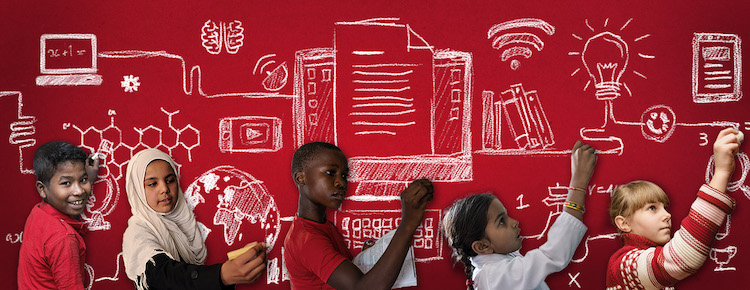Viewpoint by Dr Randa Grob-Zakhary
The author is the Founder and CEO of Education.org
ZURICH (IDN) — At the recent Transforming Education Summit in New York, 130 countries pledged to reboot their education systems and accelerate action to tackle the global learning crisis. Fifty foundations pledged to support those ambitions.
As UN Secretary-General António Guterres outlined, COVID-19 has “dealt a hammer blow” to education systems worldwide. But this has come on top of a much longer term crisis. Too often, education systems “don’t make the grade,” the Secretary-General said, as they are “dependent upon outdated and narrow curricula, under-trained and underpaid teachers, and rote learning”.
The scale and urgency of the current learning crisis has been well documented, not least by the shocking recent finding that 70 per cent of ten-year-olds in low and middle-income countries cannot now understand a simple written text. The central importance of basic education in achieving all of the SDGs, tackling the climate crisis, conflict, and poverty are also increasingly well understood.
So while summit commitments are to be welcomed, action must now follow quickly.
The paradox here is that we already know a lot about what works—both in terms of getting children into school and making their education meaningful. A strong and growing evidence base exists. As we contemplate the challenges involved in getting quality learning to every last child, it’s clear we need to think flexibly and embrace proven alternative teaching and learning approaches.
One such solution is accelerated education. This approach has been rolled out over the past decade around the world, and most notably in several African countries, for children missing school because of extreme poverty, child labour, teen pregnancy, conflict, refugee crises, and the Ebola outbreak in West Africa.
It works by paring back the curriculum to the basics of literacy and numeracy and compressing up to three years of primary education into one school year by applying the most effective pedagogical techniques. There’s a strong focus on “social and emotional learning”. Learning is achieved by using a child-centred and interactive approach—children work in small groups, overseen by specially trained facilitators, often drawn from the local community.
One practitioner describes the approach as ‘joyful learning’—learning through interaction and locally relevant examples, young people organically developing attributes such as independent thought, problem-solving collaboration and confidence.
Accelerated learning programmes have also demonstrated the importance of actively engaging communities in support of their children’s education, working side by side to ensure the most vulnerable children—adolescent girls, children who’ve experienced conflict and trauma, those with learning differences or disabilities—are specifically targeted.
The results of these approaches speak for themselves: dramatic learning gains, with children mastering reading and writing in their foundational year, then transitioning into the formal school system. In some cases, such as Ethiopia’s Speed Schools or Liberia’s Second Chance program, over 90 per cent of learners transition into formal education. Tellingly, they often outperform their peers.
There’s a winning formula at work here that can inform how we think more broadly about transforming education so that it fulfils the promise we owe coming generations. The best accelerated learning programmes are succeeding because they combine the latest pedagogical thinking around developing lifelong learners with a strongly tailored approach that’s adapted to each unique context. Critically, they contain proactive measures to ensure the most vulnerable and marginalised kids are not left behind.
So why don’t all countries now follow this formula, especially as they look at how to tackle the learning losses caused by pandemic shutdowns? Certainly, funding is a barrier for lower income countries, a topic which was discussed in-depth at the UN summit. But it’s not the only answer.
One of the challenges is the persistent the gap between knowledge and action. Too often, evidence around a key solution exists but it is not available to policy makers in a form they can use to guide their plans. For example, while accelerated learning has historically been used to support children who never attended school or who have been out of school for a prolonged period, many principles and lessons are transferable for post-pandemic learning recovery.
To this end, we have synthesized the global evidence on accelerated learning, much of previously unpublished, and produced an evidence-based policy guide for education leaders. We are working with countries to put its findings into action, including the imperative to make sure all accelerated and catch-up learning programmes are firmly integrated into the education system and aren’t operating in silos on their own.
While COVID-19 has ushered in the worst educational crisis in history, with huge implications for the futures of a generation of children, the good news is that leaders can accelerate learning for all children if they put in place thoughtful policies based on the evidence. [IDN-InDepthNews – 24 September 2022]
For more information, see: https://education.org/accelerated-learning
Photo: UNICEF
IDN is the flagship agency of the Non-profit International Press Syndicate.
This article is published under the Creative Commons Attribution 4.0 International licence. You are free to share, remix, tweak and build upon it non-commercially. Please give due credit.

